Filter by
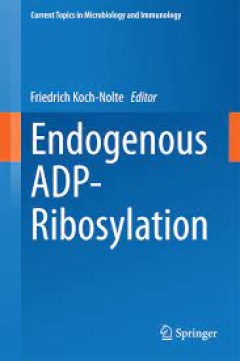
Endogenous ADP-Ribosylation
This volume gathers the latest exciting findings on ADP-ribosylation from renowned experts in the field. It includes ten chapters, organized into the following three thematic sections: · Evolution and detection of endogenous ADP-ribosylation · ADP-ribosylation by the ARTC family of ADP-ribosyltransferases (R-S-E ARTs) · ADP-ribosylation by the ARTD family of ADP-ribosyltransfe…
- Edition
- -
- ISBN/ISSN
- 978-3-319-10771-4
- Collation
- VIII, 213
- Series Title
- -
- Call Number
- -

Endocannabinoids
There is currently considerable interest in the development of medicines that would enhance endocannabinoid-induced “autoprotection”, for example through inhibition of endocannabinoid metabolizing enzymes or cellular uptake processes or that would oppose endocannabinoid-induced “autoimpairment”. This volume describes the physiology, pathophysiology and pharmacology of the endocannabinoi…
- Edition
- -
- ISBN/ISSN
- 978-3-319-20825-1
- Collation
- XII, 475
- Series Title
- -
- Call Number
- -
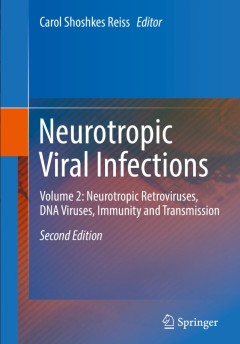
Neurotropic Viral Infections:Volume 2: Neurotropic Retroviruses, DNA Viruses,…
This second edition is a comprehensive study of the viruses that affect the brain and the central nervous system. Along with a focus on the viruses themselves, it addresses the diseases they cause, current treatments and preventive measures. Also discussed are the unique aspects of how viruses cause disease and why certain hosts are more susceptible (e.g., polymorphisms, age, co-morbidities). …
- Edition
- 2
- ISBN/ISSN
- 978-3-319-33188-1
- Collation
- XII, 557
- Series Title
- -
- Call Number
- -
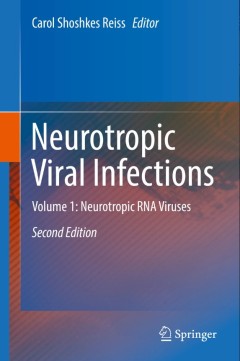
Neurotropic Viral Infections:Volume 1: Neurotropic RNA Viruses
This second edition is a comprehensive study of the viruses that affect the brain and the central nervous system. Along with a focus on the viruses themselves, it addresses the diseases they cause, current treatments and preventive measures. Also discussed are the unique aspects of how viruses cause disease and why certain hosts are more susceptible (e.g., polymorphisms, age, co-morbidities). …
- Edition
- 2
- ISBN/ISSN
- 978-3-319-33131-7
- Collation
- X, 370
- Series Title
- -
- Call Number
- -
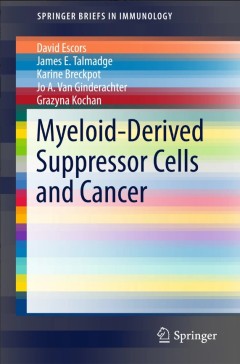
Myeloid-Derived Suppressor Cells and Cancer
The book starts with an introduction to and history of myeloid-derived suppressor cells (MDSCs), followed by a description of their differentiation, their role in the tumour microenvironment and their therapeutic targeting. It closes with an outlook on future developments. In cancer patients, myelopoiesis is perturbed and instead of generating immunogenic myeloid cells (such as dendritic cells,…
- Edition
- 1
- ISBN/ISSN
- 978-3-319-26819-4
- Collation
- IX, 102
- Series Title
- SpringerBriefs in Immunology
- Call Number
- -
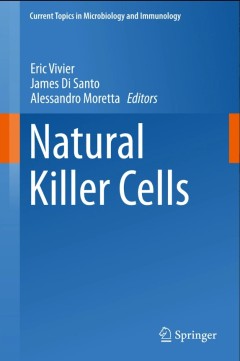
Natural Killer Cells
To celebrate the 40th anniversary of the discovery of Natural Killer (NK) cells, this volume focuses on the recent advances in our understanding of NK cell development and differentiation and their acquisition of functional properties, as well as the latest models for NK-cell analysis in mice and applications in clinical medicine. NK cells have travelled a circuitous path from their initial des…
- Edition
- 1
- ISBN/ISSN
- 978-3-319-79554-6
- Collation
- VIII, 247
- Series Title
- Current Topics in Microbiology and Immunology
- Call Number
- -
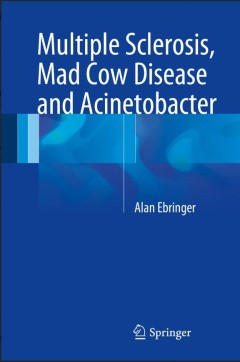
Multiple Sclerosis, Mad Cow Disease and Acinetobacter
The aim of this book is to publicise and bring to a wider audience the concept that the cause of two neurological diseases, namely multiple sclerosis (MS) and “mad cow disease” also known as “bovine spongiform encephalopathy” are related through exposure to a common microbe Acinetobacter which is found in human sinuses, on skin and in the soil. An infection is the cause of a neurologica…
- Edition
- 1
- ISBN/ISSN
- 978-3-319-02734-0
- Collation
- XVIII, 200
- Series Title
- -
- Call Number
- -

Emerging and Evolving Topics in Multiple Sclerosis Pathogenesis and Treatments
Over the past decade, we have made great advances in the field of multiple sclerosis (MS) research, and this book focuses on those advances in MS pathogenesis and treatment. While some of these advances have been through new approaches and ideas that have emerged in the last decade such as the newly identified protective role that amyloid proteins may play in MS or the use of helminths to treat…
- Edition
- -
- ISBN/ISSN
- 978-3-319-25543-9
- Collation
- XII, 235
- Series Title
- -
- Call Number
- -

The Th2 Type Immune Response in Health and Disease From Host Defense and All…
The type 2 immune response that develops during infectious disease has undergone major paradigm shifts in the last several years as new cell types and pathways have been identified. It is now clear that the type 2 immune response, characterized by elevations in specific cytokines, including IL-4, IL-5 and IL-13, is associated with helminth infections in both humans and mice. This response is co…
- Edition
- -
- ISBN/ISSN
- 978-1-4939-2911-5
- Collation
- -
- Series Title
- -
- Call Number
- -

Elispot for Rookies (and Experts Too)
This book provides basic, simple, and logical explanations for choices to be made to run the best Elispot possible. It allows the newcomer to truly understand the best options for specific protocol steps, reagents and materials, and provides even the experienced Elispot user with insight into best practices. The techniques presented here are supported by the author’s twenty-plus years of firs…
- Edition
- 1
- ISBN/ISSN
- 978-3-319-45295-1
- Collation
- 7 b/w illustrations, 32 illustrations in colour
- Series Title
- -
- Call Number
- -
 Computer Science, Information & General Works
Computer Science, Information & General Works  Philosophy & Psychology
Philosophy & Psychology  Religion
Religion  Social Sciences
Social Sciences  Language
Language  Pure Science
Pure Science  Applied Sciences
Applied Sciences  Art & Recreation
Art & Recreation  Literature
Literature  History & Geography
History & Geography